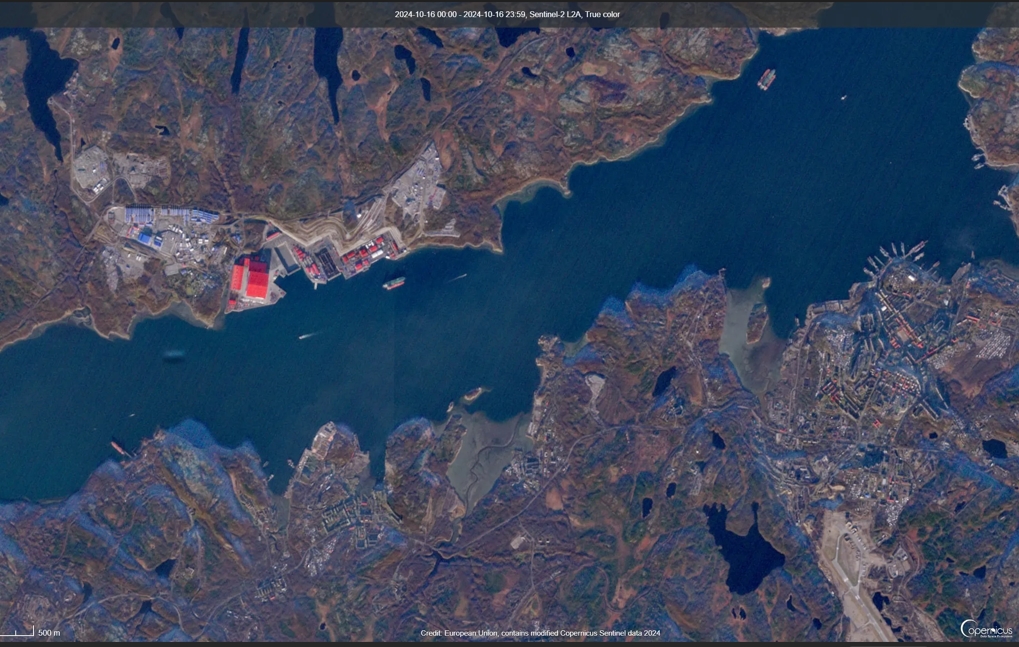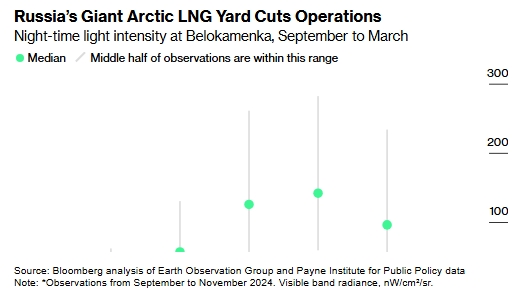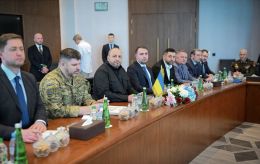Major Russian LNG plant goes dark amid sanctions fallout
 Illustrative photo (Getty Images)
Illustrative photo (Getty Images)
Activity has sharply declined on Russia's sole construction site for manufacturing liquefied natural gas (LNG) modules, marking yet another sign that Western sanctions are undermining Moscow's ambitions to become a leading player in this key energy market, according to Bloomberg.
The Novatek PJSC facility in Belokamenka, located on the Barents Sea and referred to as "the plant to make LNG plants," appears to have been largely abandoned.
Satellite observations analyzed by the Earth Observation Group at the Payne Institute for Public Policy in Colorado reveal that nighttime illumination at the site in late October and early November was at its lowest level since 2019.

Copernicus Sentinel
The facility was expected to become a unique hub for assembling so-called LNG trains - modular processing plants capable of cooling natural gas into liquid form. However, after completing two trains for Arctic LNG 2, Russia’s newest export project, there is little sign of the activity needed to expand production capacity further soon.
This is a consequence of efforts by the US and Europe to limit Moscow's energy revenue following its invasion of Ukraine. Western nations imposed sanctions on Novatek and all its future LNG projects, including production facilities, transshipment terminals, and tankers.
"The average brightness of electric lights at the facility has fallen by 75% compared to 2021 to 2023, indicating a sharp decline in industrial activity," said Dr. Mikhail Zhizhin, an EOG researcher.
Bloomberg
Gas project challenges
Instead of constructing LNG facilities from scratch in the harsh Arctic climate, Novatek proposed assembling them in milder conditions near the port of Murmansk. At the Belokamenka shipyard, the first two lines for Arctic LNG 2 were built, each consisting of 14 modules mounted on giant floating gravity platforms.
Once completed - one in July 2023 and the other earlier this year - they were towed approximately 1,500 nautical miles along the Northern Sea Route by a small fleet of tugs and anchored on the Gydan Peninsula, a journey lasting about three weeks.
These trains were successfully installed at Arctic LNG 2, with one of them producing LNG until the first half of October. However, Western sanctions have significantly hindered transportation and sales of shipments, largely halting the facility.
A partially constructed third train remains at Belokamenka, according to satellite imagery. Reports suggest that Novatek plans to wind down operations at Belokamenka by 2025 or early 2026.
Satellite monitoring
Satellites have been tracking nighttime surface illumination globally since the 1970s, with these data serving as indirect indicators of ground-level activity. They have been used to assess industrial development, population shifts, and regional economies. This approach provides detailed insights into the performance of individual facilities, such as sawmills in British Columbia.
At the Novatek site, light intensity was at its peak from 2022 to 2023, coinciding with the construction of two lines for Arctic LNG 2. The subsequent dimming at Belokamenka suggests halted construction and a retreat from Russia's goal of capturing up to 20% of the global LNG market within the next decade.
"Future Russian LNG projects were also set to use the Belokamenka construction center to pre-assemble modules," said Laura Page, a natural gas and LNG analyst at research firm Kpler.
The lack of activity at the site indicates delays in these projects, which "were deemed critical for Russia to achieve its goal of reaching 100 million tons a year of LNG export capacity by 2030."
Moscow’s plans for Arctic LNG 2 faced complications last year when it was added to Western sanctions due to Russia's invasion of Ukraine. This prompted foreign stakeholders to freeze their participation and led Novatek to declare force majeure.
US Assistant Secretary of State for Energy Geoffrey Pyatt stated that Washington aims to "strangle" this Russian project.


